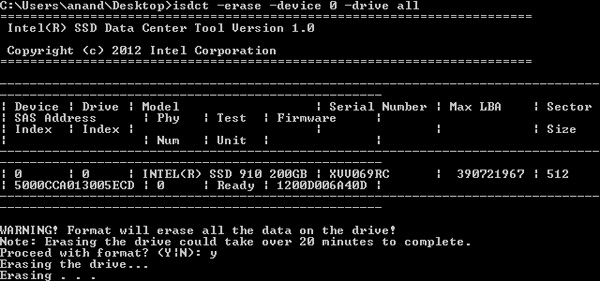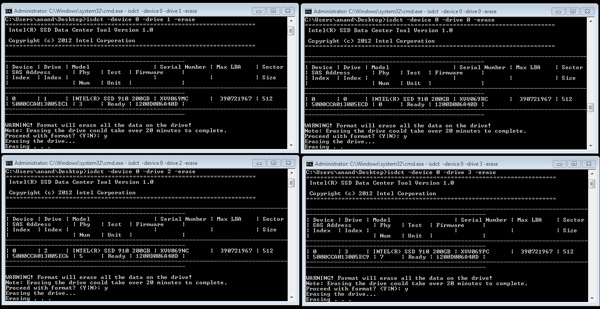The Intel SSD 910 Review
by Anand Lal Shimpi on August 9, 2012 1:00 PM EST- Posted in
- Storage
- SSDs
- Intel
- Intel SSD 910
Intel's SSD Data Center Tool
Despite Intel's wonderful desktop SSD toolbox, there's a more powerful but less user friendly option for the 910. It's called the Intel SSD Data Center Tool (isdct for short) and it's driven entirely by the command line. The tool is available for both Windows and Linux. You can use the isdct to secure erase the 910:
Each controller/partition must be secure erased independently, or in tandem by running four copies of isdct:
Since each partition is effectively an independent drive, you can run multiple isdct commands and just target a different drive with each instance. The isdct is also how you monitor temperatures on the individual drives, once again you have to execute a command per drive to get the temperature of that drive. Under Windows you need to execute the following command:
isdct.exe –log 0x2F –drive <drivenum> -device <devicenum> -verbose
Then look at the value of byte 10, which will tell you the current temperature...in hex. Convert back to decimal and you'll have the temperature of the specified NAND partition in degrees C. I have to admit I found all of this a bit endearing (I never get to read temperatures in hex), but your system administrator may be less impressed. Thankfully it shouldn't be all that difficult to script the isdct to quickly give you the data you want, even at regular intervals. The tool exposes quite a bit and since it's entirely command line driven it's pretty easy to automate, but I can't help feel like Intel should at least do some of this for you. I appreciate the flexibility, but others may want something a bit simpler.
Other than obsessively monitoring temperatures (I never saw a temperature higher than 1F, 37 is the operational limit) and secure erasing the drives, I used the isdct to switch between performance modes on the 910:
Remember the 400GB drive always runs in this max performance mode, but the 800GB drive must be forced into it. You get a warning about the increased cooling and power requirements (up from 25W max TDP and 200 LFM cooling requirement) but otherwise the process is painless.













39 Comments
View All Comments
web2dot0 - Friday, August 10, 2012 - link
That's why you need a comparison buddy. Otherwise, why don't we just read off the spec sheet and declare a winner? Let's face it z-drive r4 is NO FusionIO ok.FusionIO is a proven entity backed my a number of reputable companies (Dell, HP, etc...). Those companies didn't sign on because the cards are crap. Who's backing Z-Drive?
They are the standards in which enterprise SSDs are measured. At least, that's the general consensus.
happycamperjack - Friday, August 10, 2012 - link
Spec sheet? did you even read the benchmarks in that comparison? FusionIO's ioDrive clearly lost out there except for low queue situation.As for who's backing OCZ's enterprise SSD, let's see, Microsoft, SAP, ebay just to name a few. I don't know where you get the idea that OCZ's enterprise products do not meet the standard, but they are currently the 4th largest enterprise SSD provider. So you are either very misinformed, or just a clueless FusionIO fanboy.
web2dot0 - Sunday, August 12, 2012 - link
Come on dude.You are clearly looking at the specsheets. The feature sets offered by FusionIO cards are light years ahead of OCZ cards.
The toolset is also light years ahead. It's not always just about performance. Otherwise, everyone will be using XEN and nobody will be using VMWARE. Get it?
I would like to see a direct comparison of FusionIO cards (on workloads that enterprises matter), not what you THINK it will perform.
You are either very much misinformed or you are a clueless kid.
happycamperjack - Thursday, August 16, 2012 - link
what spreadsheet? I'm comparing the benchmark charts at later pages, which you obviously have not clicked through. There's enterprise comparisons too ok kid?what's great about FIO is its software sets for big data and its low latency and high low queue data access performance. but if just comparing single card performance per GB price ratio, FIO is overpriced IMO. And FIO's PCIe cards' lackluster performance in high queue depth is highlighting what could be the doom of FPGA PCIe cards as the cheap ATIC controllers mature and overthrow the FPGA cards with its abundant number on a board.
My guess is that in 2 years, FPGA PCIe SSDs would be used only in some specialized Tier 0 storages for high performance computing that would benefit from FPGA's feature sets. Similar to Rambus's RDRAM's fate.
And if OCZ is good enough for MS's Azure cloud, I don't see why it's not good enough for other enterprise
hmmmmmm - Saturday, August 11, 2012 - link
unfortunately, they are comparing the 910 to a 2009, discontinued card from fusion-io. would like to see a new card in the comparison to be able to compare what's on the market todayhappycamperjack - Thursday, August 16, 2012 - link
I love to see some ioDrive 2 comparisons too. Unfortunately I can't find any.zachj - Thursday, August 9, 2012 - link
Does the 910 have a capacitor to drain contents of DRAM to flash during a power outage?FunBunny2 - Thursday, August 9, 2012 - link
It looked like it, but I didn't read a mention. Could be bad eyesight.erple2 - Thursday, August 9, 2012 - link
For the market that this targets, you should never have a power outage that affects your server. These are too expensive to not have some sort of redundant power source like at least a solid ups, or better yet, a server room backup power generator.That having been said, if you look at the main PCB, you can see 4 capacitors of some sort.
mike_ - Saturday, August 11, 2012 - link
>>For the market that this targets, you should never have a power outage that affects your server.You'd wish it weren't so, but environments can and will fail. If it has capacitors and such that's great, if it doesn't this device is effectively useless. Surprised it didn't get mentioned :)